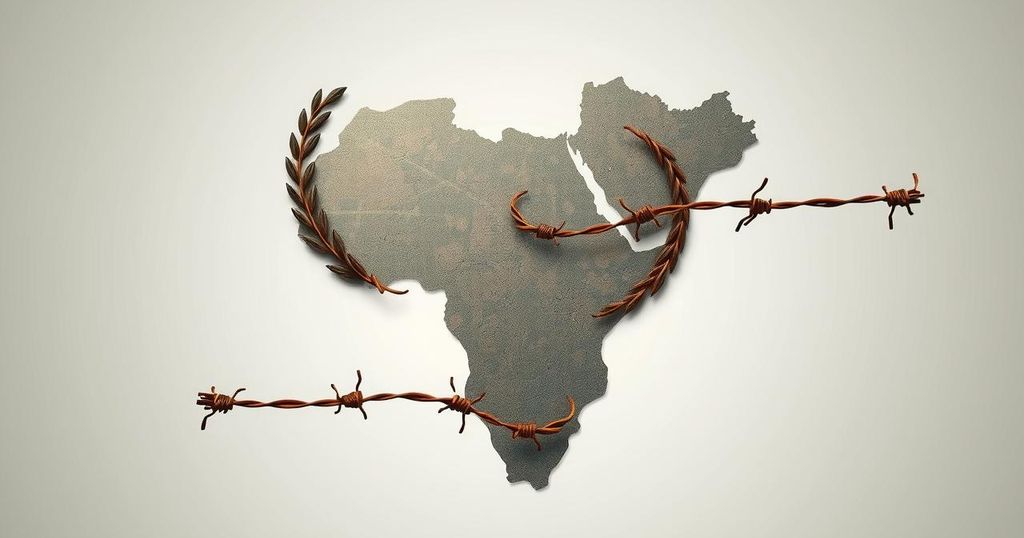Tensions have escalated between South Africa and Rwanda over accusations of Rwandan-backed M23 rebels killing South African peacekeepers in DR Congo. South Africa warned of a possible declaration of war, while Rwanda’s president accused it of being a belligerent force. Both countries have a history of strained relations, exacerbated by recent military casualties and diplomatic exchanges. Economic interests and military capabilities further complicate the situation as a Southern African Development Community summit approaches.
Tensions between South Africa and Rwanda have escalated after South African President Cyril Ramaphosa accused the Rwandan-backed M23 rebel group of killing South African peacekeepers in eastern Democratic Republic of Congo (DR Congo). Following a significant territorial gain by the rebels, South Africa warned that any further assaults on its troops would constitute a “declaration of war.”
In response, Rwandan President Paul Kagame criticized South Africa’s military involvement, describing it as a “belligerent force” participating in operations against the Congolese populace. South African soldiers have faced numerous casualties, with 13 killed in the latest fighting as M23 advanced towards Goma, a key economic center near the Rwandan border.
The long-standing diplomatic friction between the two countries previously saw tensions flare in 2014 over the attack on an exiled Rwandan dissident’s home in South Africa, leading to expulsions of diplomats from both sides. Despite prior improvements in relations after Ramaphosa’s visit to Rwanda for genocide commemorations, recent events have reignited hostilities following the deaths of South African soldiers stationed in DR Congo as part of a regional peacekeeping effort.
The conflict between South Africa and Rwanda intensified via social media exchanges, with Ramaphosa stressing the importance of a ceasefire and peace negotiations, while also claiming that South African troops were targeted by both M23 and Rwandan forces. Kagame rejected the accusations, asserting that South Africa’s portrayal of the situation was misleading and distorting realities on the ground.
South African Defence Minister Angie Motshekga articulated that the authorities had not declared war; rather, President Ramaphosa issued a warning in response to aggressive fire towards South African forces. The Rwanda Defence Force was clarified as a legitimate army, not a militia, contradicting Ramaphosa’s assertions regarding troop involvement in the assaults.
Kagame dismissed South Africa’s capacity to mediate effectively in the conflict and highlighted Rwanda’s need to protect its own interests amidst external military engagement in DR Congo. He called for South Africa to either adjust its approach to peacekeeping or prepare for potential conflict repercussions.
The history of South Africa’s military involvement in DR Congo stretches back to its post-apartheid era, aiming to stabilize the region while accommodating its economic interests in mineral resources. The regional peacekeeper initiative, which included troops from various Southern African nations, sought to engage and repel armed groups such as M23 while addressing the complex security fabric in eastern DR Congo.
Parallel to military developments, South Africa’s declining defense budget has hampered its military effectiveness, particularly its air support capabilities, limiting its ability to confront insurgent groups effectively. Experts opine this deterioration raises essential questions about the viability and value of South Africa’s military commitment in DR Congo, particularly under current perilous circumstances.
As the Southern African Development Community prepares for critical discussions regarding the future of peacekeeping operations, President Ramaphosa faces a formidable decision: to maintain South African troops in harm’s way or to negotiate a withdrawal, all while ensuring the safety and viability of their exit amid ongoing regional conflicts in DR Congo.
The ongoing conflict in the Democratic Republic of Congo (DR Congo) has drawn international attention, particularly regarding the involvement of neighboring countries like South Africa and Rwanda. Historically, tensions between South Africa and Rwanda date back to events surrounding the Rwandan genocide and subsequent regional power dynamics. The M23 rebel group’s resurgence poses serious implications for peacekeeping efforts and regional stability, necessitating mindful diplomatic engagements from affected nations. South African military engagement in DR Congo reflects an amalgamation of humanitarian responsibilities and economic interests, emphasizing the complex nature of regional geopolitics underlined by security, resource acquisition, and historical animosities.
In summary, the escalating tensions between South Africa and Rwanda underscore a complex interplay of military involvement, historical grievances, and current geopolitical dynamics regarding the ongoing conflict in DR Congo. Both nations face significant challenges in navigating their diplomatic relations while addressing the grave consequences of recent violence on their peacekeeping missions. Ultimately, how they respond to these challenges will likely shape the future of peace in the region and influence broader international relations.
Original Source: www.bbc.com




